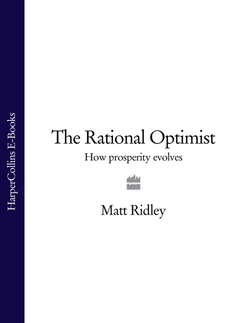Читать книгу The Rational Optimist: How Prosperity Evolves - Matt Ridley, Matt Ridley - Страница 16
Self-sufficiency is poverty
ОглавлениеIt is fashionable these days to decry ‘food miles’. The longer food has spent travelling to your plate, the more oil has been burnt and the more peace has been shattered along the way. But why single out food? Should we not protest against T-shirt miles, too, and laptop miles? After all, fruit and vegetables account for more than 20 per cent of all exports from poor countries, whereas most laptops come from rich countries, so singling out food imports for special discrimination means singling out poor countries for sanctions. Two economists recently concluded, after studying the issue, that the entire concept of food miles is ‘a profoundly flawed sustainability indicator’. Getting food from the farmer to the shop causes just 4 per cent of all its lifetime emissions. Ten times as much carbon is emitted in refrigerating British food as in air-freighting it from abroad, and fifty times as much is emitted by the customer travelling to the shops. A New Zealand lamb, shipped to England, requires one-quarter as much carbon to get on to a London plate as a Welsh lamb; a Dutch rose, grown in a heated greenhouse and sold in London, has six times the carbon footprint of a Kenyan rose grown under the sun using water recycled through a fish farm, using geothermal electricity and providing employment to Kenyan women.
In truth, far from being unsustainable, the interdependence of the world through trade is the very thing that makes modern life as sustainable as it is. Suppose your local laptop manufacturer tells you that he already has three orders and then he is off on his holiday so he cannot make you one before the winter. You will have to wait. Or suppose your local wheat farmer tells you that last year’s rains means he will have to cut his flour delivery in half this year. You will have to go hungry. Instead, you benefit from a global laptop and wheat market in which somebody somewhere has something to sell you so there are rarely shortages, only modest price fluctuations.
For example, the price of wheat approximately trebled in 2006–8, just as it did in Europe in 1315–18. At the earlier date, Europe was less densely populated, farming was entirely organic and food miles were short. Yet in 2008, nobody ate a baby or pulled a corpse from a gibbet for food. Right up until the railways came, it was cheaper for people to turn into refugees than to pay the exorbitant costs of importing food into a hungry district. Interdependence spreads risk.
The decline in agricultural employment caused consternation among early economists. François Quesnay and his fellow ‘physiocrats’ argued in eighteenth-century France that manufacturing produced no gain in wealth and that switching from agriculture to industry would decrease a country’s wealth: only farming was true wealth creation. Two centuries later the decline in industrial employment in the late twentieth century caused a similar consternation among economists, who saw services as a frivolous distraction from the important business of manufacturing. They were just as wrong. There is no such thing as unproductive employment, so long as people are prepared to buy the service you are offering. Today, 1 per cent works in agriculture and 24 per cent in industry, leaving 75 per cent to offer movies, restaurant meals, insurance broking and aromatherapy.
